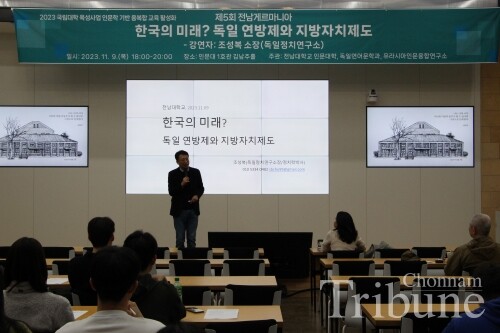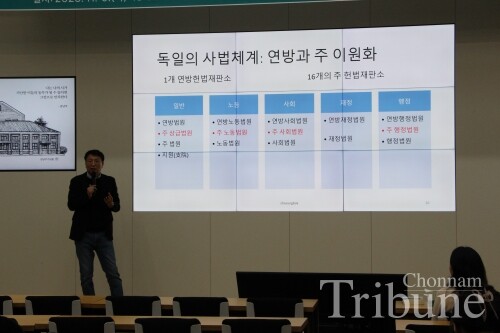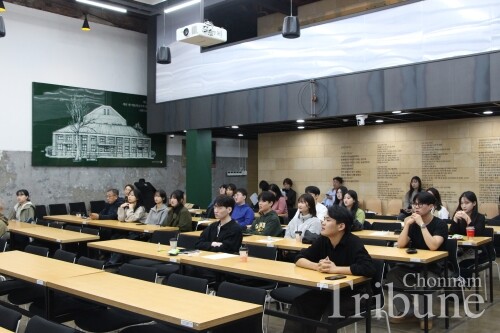
The Department of German Language and Literature at Chonnam National University has hosted a series of public lectures called "Chonnam Germania," which introduces current humanistic sociology topics related to Germany. In the second semester of 2023, three guest lectures encompassing the theme 'Local Extinction' were held. The Chonnam Tribune looked into the third and last lecture handling the problem of politics and local autonomy in Korea.
The third and last lecture from Cho Sung-bok (Director of the German Political Research Institute) was held at the Kim Nam-joo Hall located in the College of Humanities 1 building on Nov. 9. Director Cho thinks that the biggest problem in Korea is inequality. In his eyes, inequalities caused by polarization are spoiling Korean society. To resolve these inequalities rampant in society, he said the politics should be changed: An innovation in politics. Nowadays, members of the National Assembly elect are so obsessed with intensifying political strife that they do not make an effort to enact laws truly needed in real life and tend to neglect the importance of decentralization. In this extraordinary situation, he pointed out the election system is not working as expected, and the local autonomy is not being revitalized at all in Korea.
Let’s deep into two problems: the election system and local autonomy. The underlying problem of the current election system in Korea is that the two major parties have most of the seats accounting for 95%, when holding elections even though the people’s support for both parties in usual is 60~80%. It does not reflect the voters’ choice entirely. The basic problem of current local autonomy is that amid the budget allocated in each region, the amount that the mayor or governor can use by authority is less than 10%. The structure that the central government controls most of the local government’s budget disturbs public participation in politics.

He insisted that the Korean government should make a political model of the German government to solve problems. Why Germany? He answered that Germany is the ideal country for the Korean government to set appropriate standards in terms of population, territory, GDP, and many others.
The German government secures proportionality through “vote-related proportional representation”. This is the system in which the number of seats is determined according to voters’ choice. The votes in elections are reflected in the number of seats in each party. Thus, there are no wasted votes, and the majority of parties get the number of seats in proportion to the support of the electorate. It blocks the winner-take-all system where only the two largest parties get seats. Also, people in Germany can organize parties that only engage in political activities within their hometown areas. It makes possible the realization of direct and participatory democracy. Moreover, even a small constituency can collect taxes in Germany. In fact, almost every administrative work is processed under state governments, not a central government unless states have issues that must combine respective opinions together. Each state government has the right of autonomy which induces people’s active political participation.

Then, which parts of the German system should Korea benchmark? According to him, the first is introducing the German election system. The more proportionality in elections the system reflects, the more representativeness people can get. The second is strengthening the role of local government whittling down them from 17 to 10 to well operate the local autonomy. He said “With these solutions, I’m sure Korean politics will develop quickly descending the rate of inequalities. Regional extinction problems can be settled as well since more seats are assigned to every corner of each region. I hope for a better future in Korean politics.”
By Choi Daniel, Reporter

